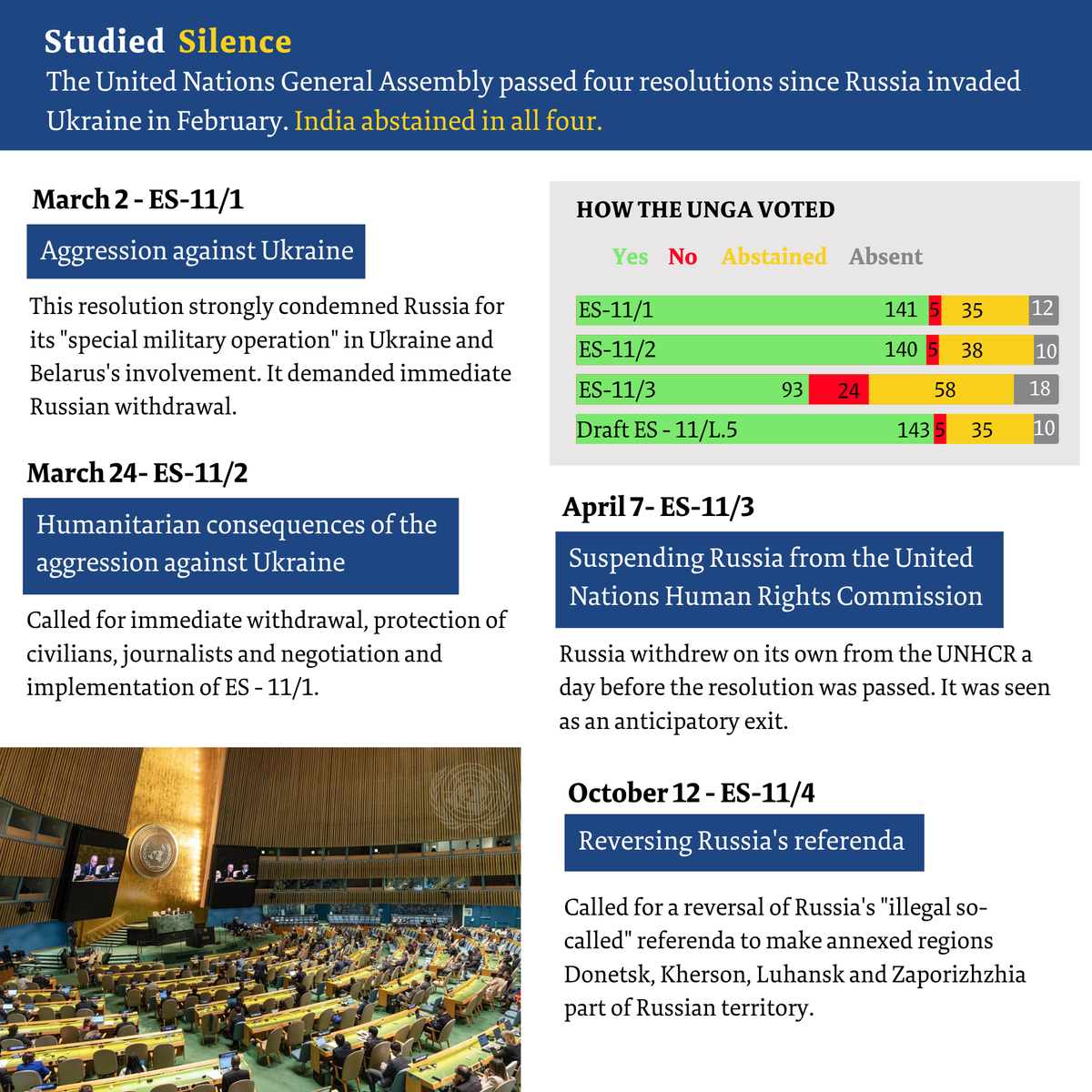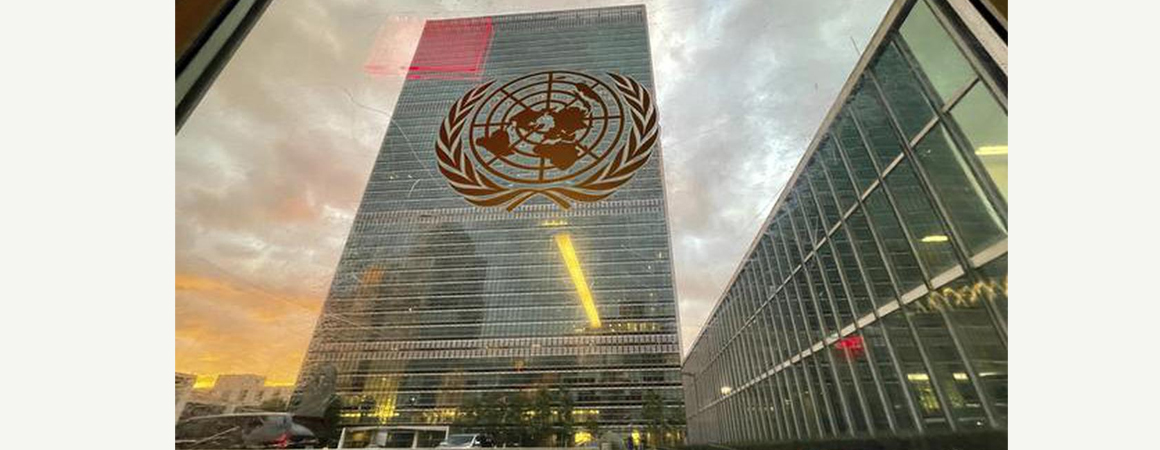Diplomatic sources say that India’s position will likely be to keep the “balance” and abstain, despite France and other countries reaching out
France is in talks to convince India to shift its position on the Russian war in Ukraine a year into the conflict, urging the Narendra Modi-led government to vote for a United Nations General Assembly (UNGA) resolution due to be tabled this week that will call for a cessation of hostilities, according to diplomatic sources. Thus far, New Delhi has refused to vote for any resolution that is critical of the war, either at the UNGA or at the UN Security Council when India was a member last year.
At an emergency session beginning on Wednesday, all eyes will be on how each of the 193 countries in the UNGA vote on the resolution that calls for talks to be held between Russia and Ukraine, and for a “lasting peace”. In October 2022, 143 UNGA members had voted to condemn Russia’s annexation of Ukrainian territories. Five countries, including Russia, voted against the resolution. India was among the 35 countries that abstained from the vote.
“We know that India is not very likely to join one side or another. It’s always a question of balance,” the sources said in response to a question from The Hindu, adding that French diplomats are in contact with “political leaders of India” and have circulated the draft of the resolution, sponsored by several countries, to all UNGA members. However, the sources conceded that India’s stand is “most likely” to be another abstention.

The United Nations General Assembly’s past resolutions and how India voted
The sources said that France and the European Union continue to hope that India will “use its links” with the Russian government to convince Russian President Vladimir Putin to end the war in Ukraine. In the last few weeks, National Security Advisor Ajit Doval visited Washington, London and Moscow in quick succession, meeting the top leaders in each capital, including Mr. Putin. However, the government has not divulged details of their conversations on the conflict, with an official statement saying only that Mr. Doval and Mr. Putin held “wide-ranging discussions on bilateral and regional issues”. India’s vote at the UNGA will also come just before a bilateral visit by German Chancellor Olaf Scholz to Delhi on Saturday.
Third country sanctions
Meanwhile, the sources said that the European Union’s 10th round of sanctions, which were announced last week and are being put into place on the one-year anniversary of the war on Friday, will be the most far-reaching sanctions yet. According to the EU’s announcement, “third country entities” will be added for the first time, starting with sanctions on Iran for providing Russia with drones. They said that EU officials are also studying whether to impose restrictions on those countries who “illegally” seek to defy the EU’s sanctions.
“We are not expecting all countries to join sanctions,” the sources said, when asked about the refusal by India and other Asian countries to cut down their oil purchases from Russia or to join EU sanctions. “Some countries are also dependent on Russia, on certain aspects of their economy and for their supplies. What we are trying to look at in the EU is to put sanctions on those people and countries who are illegally subverting the sanctions,” the sources said.
On Tuesday, Mr. Putin addressed Russian lawmakers about the conflict, accusing the U.S. and European countries of trying to involve other countries in the war, and turn it into a confrontation against Russia.
“They intend to translate the local conflict into a global confrontation, we understand it this way and will react accordingly,” Mr. Putin told lawmakers in Moscow.
Ahead of UNGA resolution on Russia, France lobbies New Delhi for vote
Diplomatic sources say that India’s position will likely be to keep the “balance” and abstain, despite France and other countries reaching out
France is in talks to convince India to shift its position on the Russian war in Ukraine a year into the conflict, urging the Narendra Modi-led government to vote for a United Nations General Assembly (UNGA) resolution due to be tabled this week that will call for a cessation of hostilities, according to diplomatic sources. Thus far, New Delhi has refused to vote for any resolution that is critical of the war, either at the UNGA or at the UN Security Council when India was a member last year.
At an emergency session beginning on Wednesday, all eyes will be on how each of the 193 countries in the UNGA vote on the resolution that calls for talks to be held between Russia and Ukraine, and for a “lasting peace”. In October 2022, 143 UNGA members had voted to condemn Russia’s annexation of Ukrainian territories. Five countries, including Russia, voted against the resolution. India was among the 35 countries that abstained from the vote.
“We know that India is not very likely to join one side or another. It’s always a question of balance,” the sources said in response to a question from The Hindu, adding that French diplomats are in contact with “political leaders of India” and have circulated the draft of the resolution, sponsored by several countries, to all UNGA members. However, the sources conceded that India’s stand is “most likely” to be another abstention.

The United Nations General Assembly’s past resolutions and how India voted
The sources said that France and the European Union continue to hope that India will “use its links” with the Russian government to convince Russian President Vladimir Putin to end the war in Ukraine. In the last few weeks, National Security Advisor Ajit Doval visited Washington, London and Moscow in quick succession, meeting the top leaders in each capital, including Mr. Putin. However, the government has not divulged details of their conversations on the conflict, with an official statement saying only that Mr. Doval and Mr. Putin held “wide-ranging discussions on bilateral and regional issues”. India’s vote at the UNGA will also come just before a bilateral visit by German Chancellor Olaf Scholz to Delhi on Saturday.
Third country sanctions
Meanwhile, the sources said that the European Union’s 10th round of sanctions, which were announced last week and are being put into place on the one-year anniversary of the war on Friday, will be the most far-reaching sanctions yet. According to the EU’s announcement, “third country entities” will be added for the first time, starting with sanctions on Iran for providing Russia with drones. They said that EU officials are also studying whether to impose restrictions on those countries who “illegally” seek to defy the EU’s sanctions.
“We are not expecting all countries to join sanctions,” the sources said, when asked about the refusal by India and other Asian countries to cut down their oil purchases from Russia or to join EU sanctions. “Some countries are also dependent on Russia, on certain aspects of their economy and for their supplies. What we are trying to look at in the EU is to put sanctions on those people and countries who are illegally subverting the sanctions,” the sources said.
On Tuesday, Mr. Putin addressed Russian lawmakers about the conflict, accusing the U.S. and European countries of trying to involve other countries in the war, and turn it into a confrontation against Russia.
“They intend to translate the local conflict into a global confrontation, we understand it this way and will react accordingly,” Mr. Putin told lawmakers in Moscow.







NO COMMENT